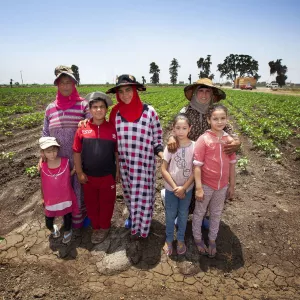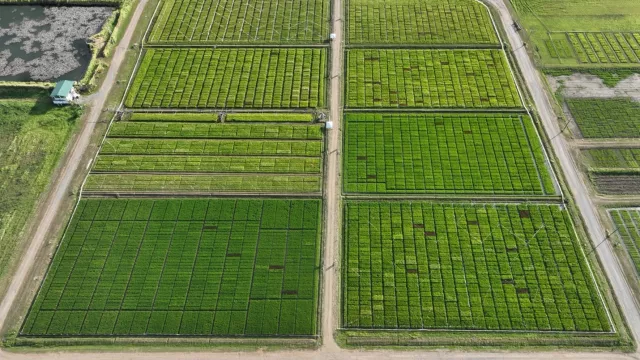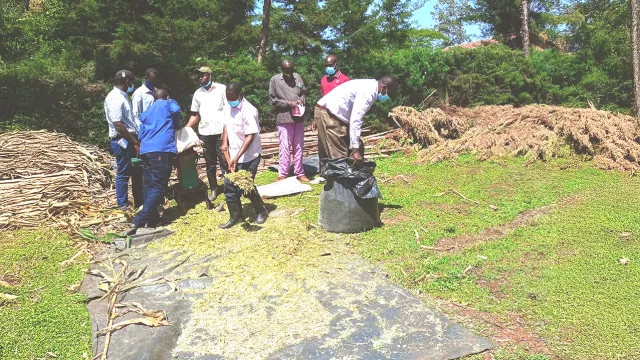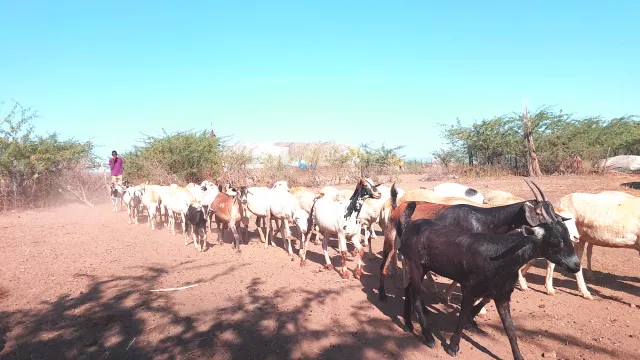Central and West Asia and North Africa

About
As one of the most water scarce regions in the world, the Central and West Asia, and North Africa (CWANA) region is highly vulnerable to the impacts of climate change, population growth, and ill-planned land use. Yet this vast dryland region offers huge research potential through its wide variations in agroecology, farming systems, water accessibility, climate, soil types, local expertise, and cultural practices. There is also a rich abundance of unique biodiversity already adapted to harsh conditions, which can help global climate change adaptation efforts.
CGIAR’s approach puts the knowledge, experience, and challenges of the dryland communities we serve at the center of our research to ensure a vision of thriving and resilient livelihoods in the region becomes a reality. A future where small-scale dry region farmers and food systems workers can achieve adequate incomes, secure access to food, markets, and nutrition, and can manage limited natural resources in equitable, sustainable, and innovative ways.
Through research and development in efficient, safe, and sustainable use of water, livestock, improved crops and green energy, integrated desert farming approaches and better land use, sustainable food and nutritional security and reduced poverty can be achieved in the region.
Building on four decades of innovation and trusted partner networks in the region, CGIAR and its partners offer unique dryland expertise and proven, demand-driven solutions to regional challenges, incorporating the region’s abundance of climate-smart biodiversity and green energy potential.
Work in this region is further coordinated by the Regional Director for Continental Africa.
Challenges and Opportunities
- In recent decades, the CWANA region has become a climate hotspot as increasingly variable rainfall, along with intensifying heat and aridity, exacerbates challenges in the world’s most water-stressed and socially fragile region. Agriculture and water are the region’s key vulnerabilities.
- Climate impacts and poor land use have put increasing demands on the region’s’ agroecosystems as the main source of food and protein, affecting food security and livelihoods. Water scarcity, biodiversity depletion and land degradation are accelerating, reducing farm productivity, and sharpening social and political divides. Rural unemployment is driving over-urbanization, deepening inequality for women and youth.
- Action is urgently needed to build more resilient agri-food systems and resilient livelihoods to withstand the effects of climate change and evade mass displacement and instability.
- The region offers vast potential for global research and climate adaptability through abundant plant and animal biodiversity already adapted to harsh conditions, as well as exciting developments in green energy such as solar and wind.
- CWANA also leads the way in desert farming practices, which are now adapting to climate change through integrated innovations and approaches that address the main vulnerabilities of water scarcity, loss of biodiversity, heat, and land degradation.
Research and Action
- Bring together alliances of national, international, and private stakeholders to develop innovation and research platforms that will drive agri-food systems transformation and scale up.
- Intensify and scale up diversified, sustainable and climate-adapted crop, livestock and seed systems to fill nutritional gaps, reduce water use, and hit biofortification targets.
- Improve water and energy management to strengthen transformational agricultural practices and maintain ecosystem services.
- Examine the root causes of the challenges to identify transformative solutions, while including a broad range of levers to address questions of political economy, nutrition, pests and diseases, and climate security.
Partners
With over four decades in the CWANA Region, CGIAR has developed long and trusted partnerships in the region with key partners and stakeholders. The support and expert knowledge of governments, research institutions, the private sector, and farmer communities, ensure that the climate-smart solutions CGIAR delivers are demand- and market-driven, and tailored to specific challenges in one of the most climate-vulnerable regions in the world.
Collaboration is critically important to ensure that research for development can thrive, and CGIAR is grateful to partners such as the African Development Bank (AfDB), Arab Fund for Economic and Social Development, Gulf Cooperation Council, International Fund for Agricultural Development (IFAD), and the European Commission whose critical understanding of regional issues, and the funding and facilitation they provide are essential in developing climate-smart, sustainable agri-food systems that can deliver better lives for the people we serve.
News
-

Plant breeding is a critical tool in the fight against climate change
Fighting climate change requires a comprehensive strategy that spans energy, transport, and, crucially, food and agriculture. Halting deforestation...
-

How citizen science is transforming pastoral resilience
In northern Kenya, KAZNET - a CGIAR digital platform - is empowering herders to collect, share, and act on real-time data about rangelands, markets,...
-

Bridging silage quality gap: A study with smallholder dairy farmers
Silage is vital for Kenya’s smallholder dairy farmers, yet poor quality limits productivity. A CGIAR / ILRI demand-driven study in Nandi and Bomet...
-

Hidden in Plain Sight: Pastoralist ‘pioneers’ redefining resilience
Pastoralist communities in Ethiopia are redefining climate resilience through locally developed practices in animal health, grazing, and forage...
Publications
-
Progress Report Ethiopias Partnership for Accelerating Agricultural Solutions Scaling PAASS
-
Seasonal variation in mosquito abundance and environmental predictors in semipastoral southern Kenya implications for endemic Rift Valley fever
Background: Ecological variables that vary across time and space shape mosquito populations, creating microenvironments that can become disease...
-
Impact of invasive weed Parthenium hysterophorus Asteraceae on mosquito abundance and plantfeeding behavior in an arboviral endemic region in Kenya
Background: Invasive alien species (IAS) are rapidly altering ecosystems, undermining biodiversity, ecosystem processes, and interspecies...
-
Knowledge attitudes and practices of women related to human and animal feces management in Ethiopia Evidence for strengthening water sanitation and hygiene WaSH initiatives
Background: Water, sanitation, and hygiene (WaSH) programs aim to prevent feco-oral disease transmission, but their effectiveness in low- and...

